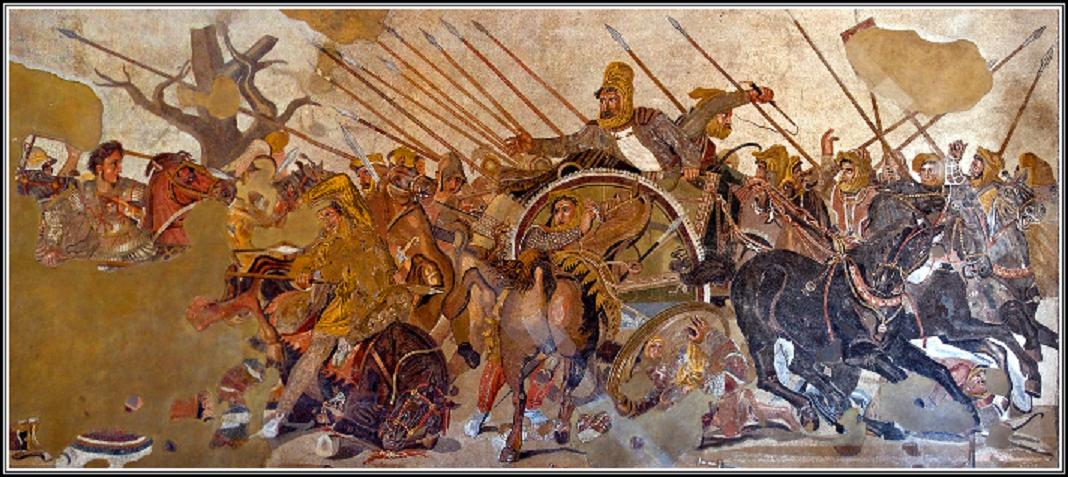Battle of Issus
Wars of Alexander the Great
In 333 BC, as Macedonian forces bivouacked at Gordium in Asia Minor, they were led by a confident, aggressive 23 year-old warrior-king who would become known to history as Alexander the Great.
Three years earlier, upon the murder of his father, Philip II of Macedon, Alexander had inherited an army superior to any other the world had yet seen. He had also inherited a mission to cross the Hellespont and liberate those Greeks who for generations had been living under Persian control.
It was not a new idea. Ten years before Alexander was even born, the veteran Athenian pamphleteer Isocrates had published an 'Address to Philip,' calling for a Panhellenic crusade against Persia under Philip's leadership. Even before that, the various Greek city-states had discussed such a crusade, one which would avenge Xerxes' invasion of a century and a half earlier. The Greeks had forgotten neither the sacrileges committed against the temples of their gods nor the humiliating settlement that had ceded the Hellenic cities of Asia Minor to Persia's 'Great King.'
Until the emergence of Philip, however, the idea of a Panhellenic 'sacred crusade' had made little progress among competing Greek states. Athens, for example, while a center of wisdom and culture, had never been able to sustain a dominant role politically or militarily. A great crusade needed a leader like Philip to head it, even though sophisticated Athenians might view him as little more than a crude barbarian.
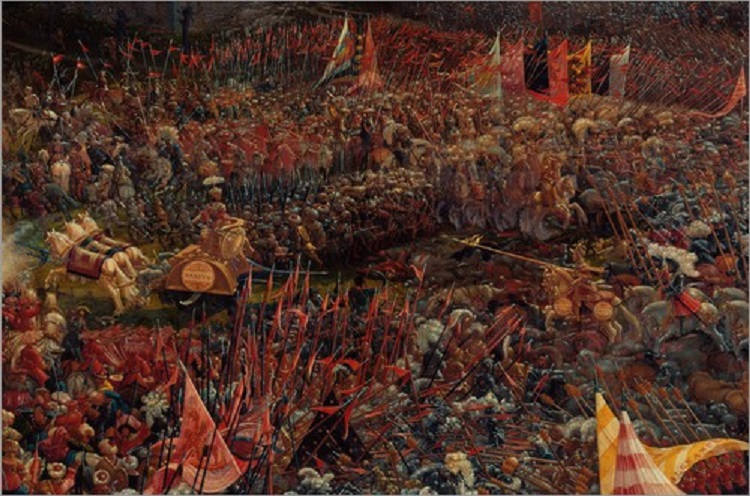
Philip, however, unable to count on the cooperation, let alone the loyalty, of other Greek states and well aware of Persia's military superiority, was forced to bide his time. In the next few years he put together a superior, well-drilled army of foot troops and cavalry, one with the mighty Macedonian phalanx as a nucleus. Simultaneously, he was also seeing to the training of his son, giving him the brilliant Aristotle as tutor and assigning him a significant military role while he was still in his teens.
Young Alexander more than fulfilled Philip's expectations. He was a splendid student and a gifted athlete, and at the age of 18 at the Battle of Chaeronea on September 1, 338 BC, he had fought heroically while commanding Macedonia's finest cavalry unit. It was an Alexander-led cavalry charge that broke the Thebian line and exposed the Athenian flank and rear, leading to an overwhelming Macedonian victory and the 'conquering' of the Greek city-states. Thus it was, upon Philip's death, that Alexander was able to become both army leader and king-he was seen as one who really deserved those titles, by ability as well as by birth. Two months later, the Hellenic League met at Corinth and there (with little choice and under a good bit of coercion) named Alexander captain general of the League's forces for the invasion of Persia. To spur things along, Alexander even introduced a delegate from Ephesus in Asia Minor who claimed to be speaking on behalf of 'the Greeks of Asia' and who urged Alexander 'to undertake a war of liberation' on their behalf.
Finally, in the early spring of 334, Alexander had set out from Pella at the head of his expeditionary force and marched for the Hellespont. With him were some 43,000 infantry and 6,000 cavalry. Of these, 12,000 infantry and 1,800 cavalry were Macedonians; the remainder were mostly tribal levies or mercenaries. The Hellenic League begrudgingly provided a number of ships for the expedition, but little else. Of the 43,000 infantry, only 7,000 were contributed by the League; of the 6,000 cavalry, the League provided a mere 600. (Calling the force 'Panhellenic' was clearly bowing to a misnomer, but it made for good propaganda.) Thanks to Alexander's inquiring scientific mind - and presumably the good influence of Aristotle - the expedition also was accompanied by a whole host of botanists, zoologists and surveyors.
After crossing the Dardanelles, Alexander began taking over certain Greek towns. While he called his actions 'liberation,' in truth the people were merely exchanging one satrap for another. The shrewd Alexander said they no longer must pay tribute to Persia; however, since they were now members of the Hellenic League, they would be given the 'opportunity' of contributing to the support of 'their' army!
Now, at Gordium in 333 BC, Alexander could look back on a year of solid triumph. Only once had he faced serious opposition, and that was at the Granicus River, where he had convincingly defeated an army led by Memnon, a Greek general fighting for Persia.
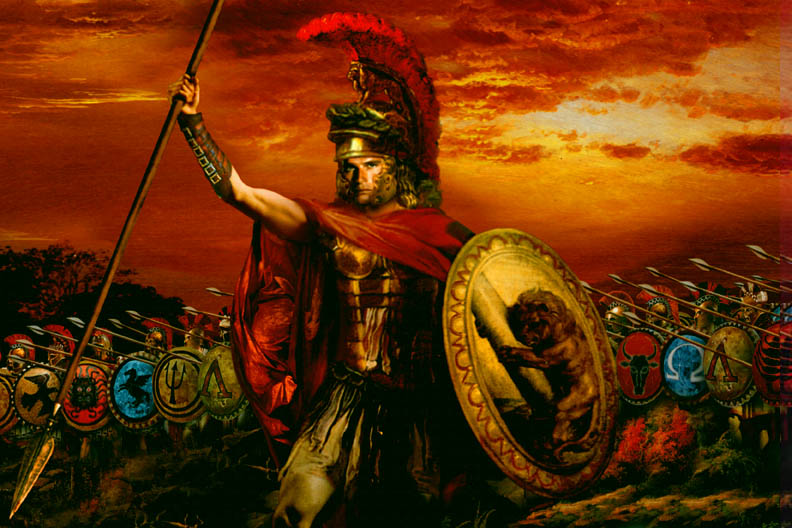
Nevertheless, Alexander had his problems, not the least of which was a shortage of funds with which to pay his mercenaries. And to his rear, a Persian fleet far superior to that of the League was threatening his line of communications. Memnon, meanwhile, who now had a score to settle, had been named commander of all Persian forces in Asia Minor and was menacing not only the towns to Alexander's rear but even Greece itself. His army had already captured key Greek islands, and on the Greek mainland, Memnon's agents were handing out bribes and doing whatever they could to stir up trouble. Sparta, it was said, was more than willing to revolt as soon as Memnon gave the word.
The question for Alexander, of course, was whether to retreat to secure his home base or to go forward and take on the entire Persian Empire, a vast conglomerate stretching from the Red Sea to the Caspian, from the Hellespont to beyond the Hindu Kush. He needed an omen, if not for his own sake (he may have already made up his mind), then at least as a positive sign for his superstitious troops.
Fortunately, Gordium provided just such an opportunity. On the acropolis above the city sat the ancient Phrygian palace of King Midas. Nearby was an ox cart with a shaft secured to its yoke by a knot of tough cornet bark. The knot (of a type known to sailors as a 'Turk's head') was closely woven and had no visible loose ends. According to legend, the man who could undo the knot would someday 'rule all Asia.'
Surely this was a challenge not to be missed. It was out of the question, in fact, to leave Gordium without accepting that challenge. Alexander climbed the hill and approached the cart as a crowd of curious Macedonians and Phrygians gathered around. They watched intently as Alexander struggled with the knot and became frustrated. The atmosphere grew tense-what would it portend if he should fail?
Alexander, stepping back, called out, 'What does it matter how I loose it?' With that, he drew his sword, and in one powerful stroke severed the knot. That night there came thunder and lightning, which the seers conveniently interpreted to mean the gods were pleased with the actions of this so-called Son of Zeus who had cut the Gordian knot.
Some historians say Alexander merely drew out the dowel peg that ran through the shaft and yoke, thus releasing the thongs; others say the incident never happened at all. The sword story persists, however, and surely seems true to character. In any case, his course was clear-he would go forward!
By mid-July, Alexander began receiving ominous reports about goings-on in Persia. Evidently his triumphs, and especially his victory at the Granicus River, had at last provoked the full attention of Persian King Darius III. The Great King had moved from Susa to Babylon and begun assembling a mighty horde. Alexander's army, having 'lost' increments of garrison troops dropped off at various points along the way, was down to about 30,000. Darius, calling on the entire Persian Empire, was capable of assembling a force numbering in the hundreds of thousands.
Alexander's expedition continued south, crossing 75 miles of parched, volcanic upland in a forced march, then passing through a narrow mountain defile known as the Cilician Gates. At the same time, Persian reinforcements were streaming into Babylon. On September 3, Alexander reached Tarsus, where he fell ill with a violent fever. Physicians were summoned, but most were unwilling to treat him, fearing they would be accused either of negligence or murder were he to die. (This was understandable, It was well known that Darius had offered a reward to anyone who managed to slay Alexander.)
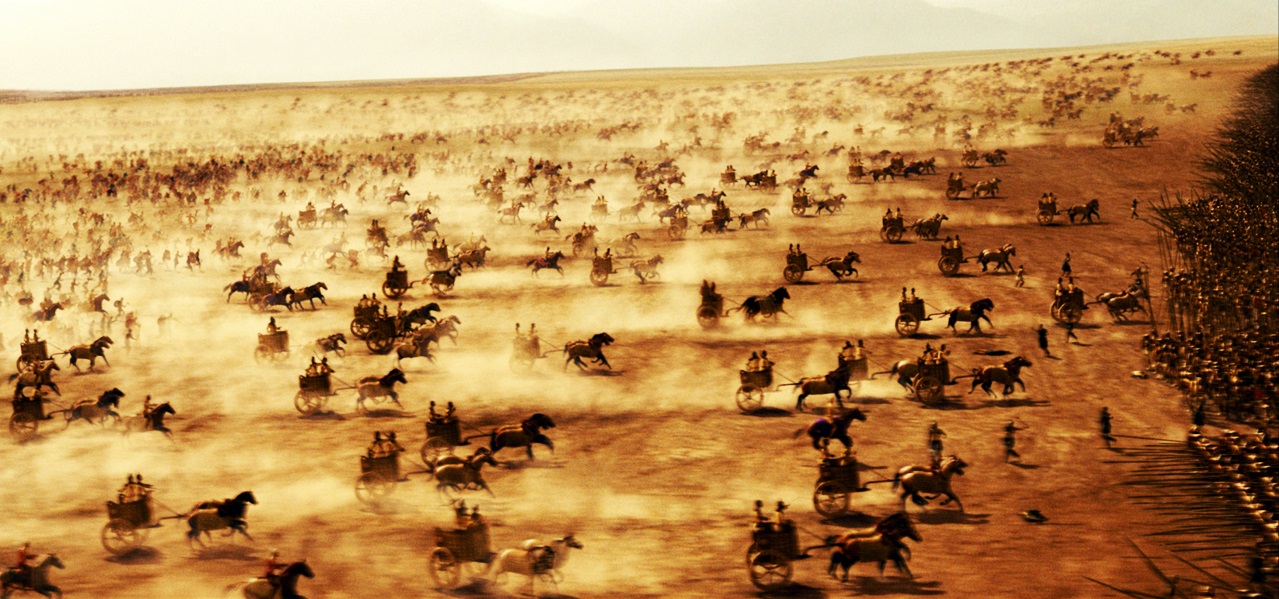
As the fever worsened, Philip of Arcarnania, a physician Alexander had known since childhood, was brave enough to step forward and offer treatment. He suggested a certain purgative drug, cautioning that there would be an element of danger. As the dose was being made up, Alexander received a letter from his general Parmenio saying that Philip had been bribed by Darius-the medicine he provided to Alexander would in fact be a deadly poison!
Unhesitatingly, Alexander took the letter to Philip and told him to read it. While Philip was still reading, Alexander surprised him by picking up the medicine and gulping it down. The purge had a violent effect, but three days later the fever was broken and Alexander began to recover. The most relieved man in camp no doubt was Philip, the physician!
By this time pontoon bridges had been constructed over the Euphrates. Darius, with perhaps as many as 500,000 men, began crossing the river and advancing, his army a ponderous juggernaut poised to overwhelm the insolent Greek invaders.
As he convalesced, Alexander sent ahead Parmenio, his senior and ablest general, to capture the little harbor town of Issus and to watch the only two passes (the Amanic Gates northeast of Issus and the Syrian Gates farther South) through which Darius could bring his army into Cilicia. Finally Alexander himself passed through Issus, leaving there his sick and wounded (evidently feeling the town was safe from attack), and continued south, passing through a constricted place known as the Pillars of Jonah.On his right, now, was the Mediterranean Sea; on his left, the rugged Amanus Mountains. As he advanced, scouts arrived with chilling reports-the Persian army, numbering in the hundreds of thousands, was gathering in the vast plain east of the mountains.
Alexander had always taken pride in his ability to anticipate an opponent's actions. At this point, perhaps acting on false information deliberately 'leaked' by the Persians, he decided Darius would make his approach through the Syrian Gates, specifically via the Beilan Pass. He proceeded to pitch camp near the pass and waited. However, this time he was wrong. Days passed, and the attack never materialized.

Alexander had underestimated his opponent. Darius III was a wily, ruthless monarch, who three years earlier had taken over a throne made vacant through an assassination arranged by Bagoas, his scheming grand vizier. Darius showed his gratitude and headed off any further intrigue by promptly forcing Bagoas to drink the poison he had often administered to others. Truly this was a man of many moves, one Alexander could ill afford to underrate.
But he did, and as a result-perhaps for the first time ever Alexander was both outsmarted and outmaneuvered. Darius, taking part of his force, advanced rapidly to the north, swept through the Amanic Gates and positioned himself astride the Greeks' line of communications in the vicinity of Issus.
In Issus itself, the Persians captured most of Alexander's hospital cases, lopped off their hands and sealed their wrists with pitch. These unfortunates were then paraded through Darius' camp, and after being suitably impressed, were turned loose and told to report what they had seen. (More than a century earlier, a similar terror tactic had been employed by Xerxes.) And soon cavalry scouts pounded into Alexander's camp to spread the grim message that he and his not-so-great host were cut off.
What had occurred was any commander's worst nightmare-an enemy in force astride one's lifeline. Alexander's Macedonians were far from home with no hope of help or reinforcement. A lesser man might have panicked. Alexander, however, supremely confident in the ability of his troops and his own destiny, moved quickly to regain the initiative. He faced his army about, sent cavalry units northward to secure his route past the Pillars of Jonah, and then dispatched other horsemen to scout out Darius' position.
The Macedonians hurried north in an incredible forced march, covering 70 miles in two days. The bone-weary foot soldiers were made even more wretched by a torrential rain that washed out their tents and left the men sodden and miserable. Nevertheless, when the weather cleared and the charismatic, ever-optimistic Alexander addressed them, his enthusiasm was contagious. When he finished his speech with a reference to Xenophon and the Ten Thousand (Xenophon of Athens had led some 10,000 Greeks on a torturous 4,000-mile retreat following the Battle of Cunaxa in 401 BC), the troops were on their feet, banging swords against shields and cheering lustily.
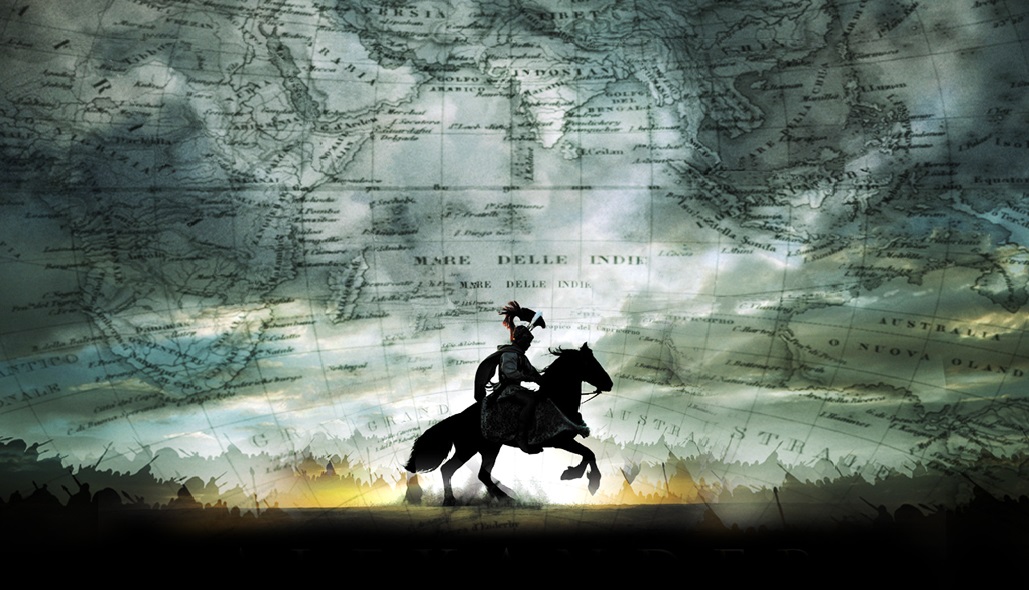
Late in the afternoon, just beyond the Pillars of Jonah, the Macedonians and their allies made camp, ate a hot meal, and saw to their weapons. Alexander and his lieutenants made an inspection tour, walking among the hoplites, who included both the pezetaeri, or foot companions, with their long spears called sarissas, and the hypaspists, or shield-bearing guards, with their swords and one-handed pikes. Nearby were the psiloi, well-organized and substantially armed light infantry. Farther off, and strung out more loosely, were irregular wild tribesmen from many lands, skilled archers, slingers and darters.
Next, after mounting his horse, the legendary Bucephalus, Alexander reviewed the cavalry, trotting past the lancers, the horse bowmen and scores of rough mercenaries. Finally he came to his finest troops, squadrons of crack horsemen from Thessaly and Greece, including his favorite unit, the Cavalry Companions. The latter group, an elite unit of Macedonian bluebloods, was the one with which he would ride into battle.
Well after dark, while his troops secured a few hours' rest, Alexander climbed a nearby hill and by torchlight made sacrifice to the gods. Looking to the north toward Issus, he could make out thousands of twinkling campfires in the Persian camp. It was not a reassuring sight for the Macedonian leader. Next morning, scouts were dispatched to reconnoiter the Persian position. As reports came in, Alexander realized he was facing a man with no small military ability. Darius had deployed his army skillfully on the far side of the narrow Pinarus River. His line extended across the entire Issus valley, its right resting on the sea, its left anchored in the foothills to the east.
Alexander set his phalanxes in motion, telling his commanders to maintain an easy, steady pace that would not tire the men needlessly-they'd soon be needing every last bit of strength and endurance.
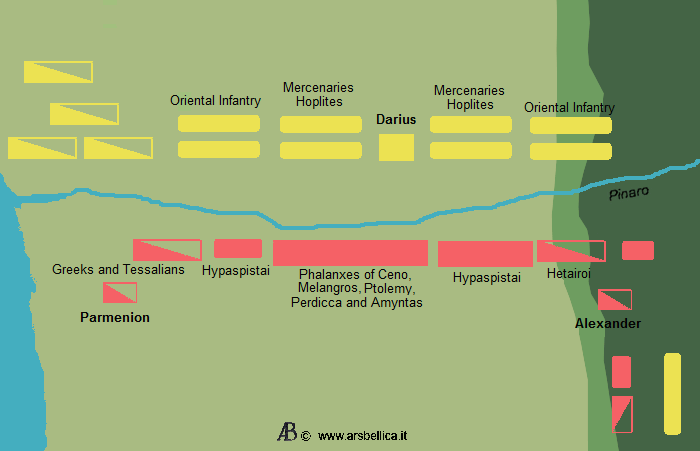
Darius had positioned a large cavalry screen south of the Pinarus to mask his dispositions, so Alexander was still uncertain as to the center of his opponent's strength. He did know that Darius' best troops, ironically, were the Persian's Greek mercenaries, seasoned veterans who would fight especially hard. Viewed as traitors to the Hellenic League, they could expect no quarter, and they would give none in return. The Persians' Asiatic levies, however, were a different matter. Alexander felt sure these ill-trained irregulars could never stand up to the Macedonian phalanxes. Up ahead, Alexander saw a scrub plain, about 2 1/2 miles wide. To his left was the sparkling blue Mediterranean. Across his front, now becoming more visible, was the shallow Pinarus, behind which was a dark mass of infantry fronted by a line of archers. To his right were foothills in which Persian cavalry seemed to be deploying. Was that where Darius planned his main effort?
The phalanxes had been advancing in column. Now, as the leading unit halted just out of archery range, the other phalanxes came abreast. Next Alexander deployed his cavalry. Parmenio would take command of the squadrons on the left.
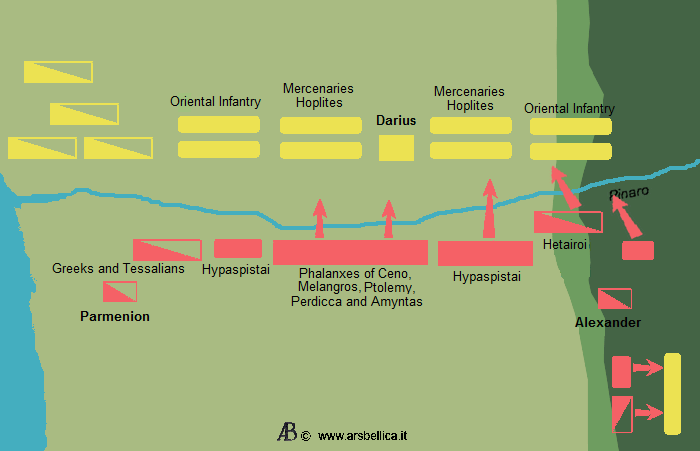
'Do not lose contact with the sea,' he told Parmenio. 'The enemy may try to turn our left flank. Do not let him!' Alexander himself then went to the right, which he felt would be the decisive point. With him were his best troops, the Thessalian cavalry and his own Macedonian Cavalry Companions.
Some horsemen and archers made a quick sally into the foothills on the right, and the Persian cavalry screen promptly withdrew. With that, the Persian disposition became a bit more visible. In the center of the line was the Royal Bodyguard, 2,000 hand-picked troops whose spear butts were decorated with golden quinces. Behind them was their Great King in an imposing ornamental chariot. On either side, filling out the line, were the best of Darius' infantry-the Greek mercenaries plus the cardaces, the latter lightly armed Persian youths who had just completed their military training. As part of their defense, the Persians had placed upright sharpened stakes along the riverbank, especially at those points where the river was dangerously low.
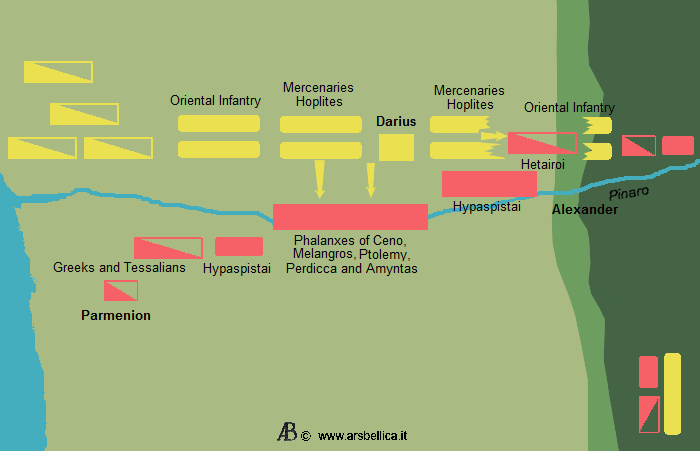
Massed behind the front line were the thousands of Persian irregulars. With grim satisfaction, Alexander noted that while Darius had the advantage of numerical superiority, the comparative narrowness of the valley effectively kept him from making much use of that advantage.
Suddenly he saw Darius' true battle plan. The Persian cavalry, including those who had begun the day acting as a screen, now moved swiftly behind the Persian front line and took up positions near the sea. It suddenly became obvious their main attack, led by the able Nabarzanes, would be made against the Macedonian left!
Alexander dispatched the Thessalian cavalry to reinforce Parmenio, along with instructions to bend back, but always to maintain contact with the sea in military terms, to 'refuse the flank.'
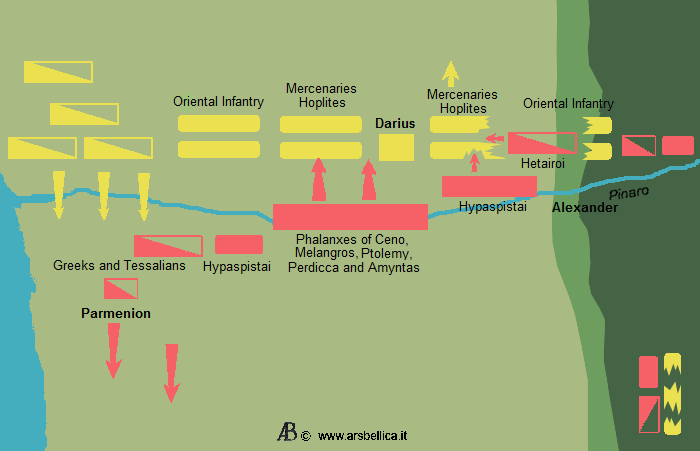
The moment had come. Raising his sword, Alexander gave the signal to launch the attack. A trumpet rang out and the phalanxes moved forward, with successive elements echeloned to the left in the formation known as an 'oblique order.' On the far right, Alexander and his Cavalry Companions shrieking like fiends, galloped across the river in an all-out charge, scattering the archers and light infantry nearest the mountain. Within moments, the Persian flank had crumbled.
As the troops facing Alexander were fleeing in disorder, the first Macedonian phalanx was becoming engaged, and for them the going was not so easy. With long spears bristling, they had moved forward and been met by swarms of arrows-in the words of one ancient writer,'such a shower of missiles that they collided with one another in the air.' After splashing across the river, the foot companions had been forced to climb a steep, bramble-covered bank, after which they had been slowed by the sharpened-stake palisades. Understandably, even the well-disciplined Macedonians were having difficulty maintaining cohesion, and to make matters worse, they were up against Darius' best Greek mercenaries.
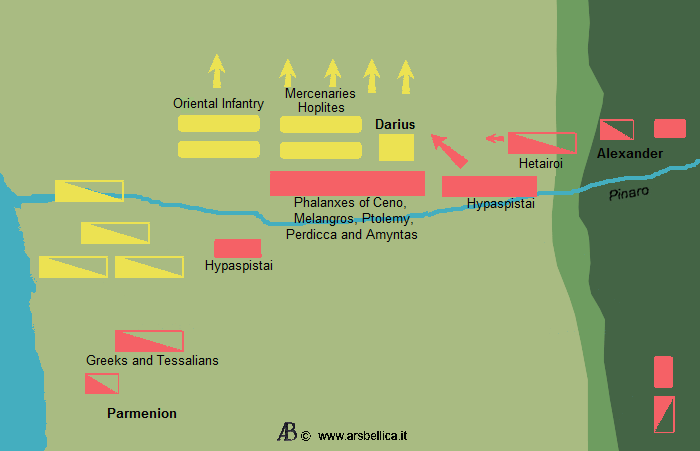
The fighting became hand to hand, fierce and bloody. Swords cut into flesh, arrows found their targets, spears were driven home, and soon the screams of the wounded were mixed with the shouts of battle and the clang of sword upon shield. Men fell in jumbled confusion, body piling upon body, as Alexander's veterans clashed with Persian veterans equally tough and equally professional.
With the phalanx slowed and the Cavalry Companions stilt moving ahead, a break formed in the Macedonian line-their opponents moved to exploit it. A wedge of Darius' mercenaries drove into the gap, swinging their swords in vicious arcs and inflicting heavy casualties, among them some 120 Macedonian officers. At this point Alexander wheeled his Cavalry Companions to the left and charged at full speed into the Persian flank. Amid a tremendous din, forcing their way through the bodies of dying horses and men, the Companions drove forward against the mercenaries, who now had to fight in two directions. It was too much-the mercenaries began to give way. With that, Alexander swung his whole right wing so as to roll up the Persian line.
A few hundred yards away, Alexander saw the ornamental chariot of Darius, which he now used as his personal aiming point. Darius was surrounded by his Royal Household Cavalry, loyal defenders of the Great King led by his brother Oxathres. They fought bravely but were no match for the Companions. Darius' chariot horses, wounded by arrows and terrified by the screams and the confusion, began to plunge and rear, at one point almost pulling the unwilling king straight into the Greek line.As Darius fought to control his chariot, Alexander continued hacking his way forward, swinging his sword left and right, ignoring the personal danger, even when someone managed to slash his thigh with a dagger. Darius, seeing his bodyguards dying and fearing for his own safety, abandoned his ornate chariot for a lighter, more mobile one and raced to safety.
For the moment, Alexander was unable to pursue the fleeing Persian king. His help was needed in the center, where the phalanxes were heavily engaged, and on the far flank, where Parmenio and the Thessalian cavalry were engaged in a fierce struggle with Nabarzanes and his heavily armored Persian horsemen.
Alexander and the Cavalry Companions, joined by succeeding echelons of Macedonian phalanxes, continued to roll up the line. The embattled Persians, who had been struck from two directions at once and abandoned by their king, lost all semblance of cohesion. Before long, their entire formation was shattered; the only remaining resistance to the Macedonian forces came from small groups whose members one by one were throwing down their arms.
Nabarzanes, looking to his rear, saw the Persian line had disintegrated. Then, learning that his king had fled, he prudently decided to follow. Within the next few minutes the entire Persian army (including the Asiatic levies who had played no part in the battle) turned into a panicky, chaotic, fleeing mob. Some of the escaping infantry were even ridden down by their own cavalry.
Fleeing Persians continued to be cut down, both by pursuing horsemen and by clouds of arrows. (Ptolemy, one of Alexander's lieutenants, later wrote that he and his squadron had ridden across a patch of deep water bridged by the pileup bodies of the dead.)
With the battle won, Alexander set off in pursuit of Darius. The daylight was fading by this time, however, and the chase was hampered by the fleeing mass of humanity blocking his path. Nevertheless, Alexander and the Companions, threading their way through the remnants of the Persian Imperial Army, kept going for some 25 miles-only after dark did they give up the chase and return to camp. (Darius had escaped for the moment, but his days were numbered. Three years later, after being decisively routed by Alexander in their ultimate confrontation at Gaugamela, and once again fleeing the battlefield, he was murdered by traitorous companions to keep him from falling into Alexander's hands.)
Back near Issus, meanwhile, Alexander's men had found Darius' base camp to be rich in plunder. Looting the Persian tents, they found jeweled swords, inlaid furniture, priceless tapestries, and countless vessels of gold and silver. Darius' own luxurious belongings were left untouched, since custom decreed they now belonged to Alexander himself.
Alexander returned to camp tired, hot and sweaty and decided that he would refresh himself by soaking in the ornate bathtub found among the Great King's possessions. When he at first referred to it as Darius' tub, his followers happily pointed out that it, like everything else the Persian king had left behind him, was no longer Darius' but Alexander's.
Later that night, Alexander heard the sound of wailing. In a nearby tent, Darius' mother, wife and children were mourning the Great King, whom they had been told was dead. As for themselves, they fully expected to be used shamefully and then executed. However, at Alexander's direction, the women were told that Darius still lived. Moreover, they were told that they themselves not only would be safeguarded but also would be allowed to keep all the titles, honors and perquisites befitting their royal status. Some historians have said that Alexander's generous treatment of the captured women was nothing but a shrewd political gesture. Be that as it may, in the story of any battle, an act of chivalry and compassion stands out in shining contrast!
Source
[1] "HistoryNet" by Harry J. Maihafer


